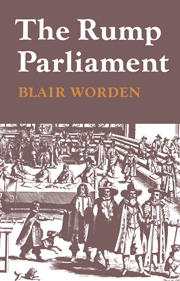Book contents
- Frontmatter
- Contents
- Dedication
- Acknowledgements
- Author's Note
- List of abbreviations
- Introduction
- PART ONE THE RUMP AND THE RUMPERS
- PART TWO THE RUMP AND REFORM
- 6 Law reform
- 7 Puritans and politicians
- 8 Electoral reform
- PART THREE THE STRUGGLE FOR SURVIVAL, FEBRUARY 1649–SEPTEMBER 1651
- PART FOUR PARLIAMENT versus THE ARMY, SEPTEMBER 1651–APRIL 1653
- PART FIVE THE DISSOLUTION OF THE RUMP
- APPENDICES
- Bibliographical Guide
- Index
- Frontmatter
- Contents
- Dedication
- Acknowledgements
- Author's Note
- List of abbreviations
- Introduction
- PART ONE THE RUMP AND THE RUMPERS
- PART TWO THE RUMP AND REFORM
- 6 Law reform
- 7 Puritans and politicians
- 8 Electoral reform
- PART THREE THE STRUGGLE FOR SURVIVAL, FEBRUARY 1649–SEPTEMBER 1651
- PART FOUR PARLIAMENT versus THE ARMY, SEPTEMBER 1651–APRIL 1653
- PART FIVE THE DISSOLUTION OF THE RUMP
- APPENDICES
- Bibliographical Guide
- Index
Summary
The Rump's discussions of the army's reform programme were strongly influenced by the particular circumstances which gave rise to them, and which will be considered in the narrative section of this book. Before we turn to narrative, however, it will be well to consider some of the issues involved in the three main subjects on which the reform movement touched: the law, religion, and the relationship between parliament and electorate.
Few features of English society were subjected to such sustained and voluble criticism during the revolution as the legal system. The common law was predominantly the product of the medieval world, its character determined by the needs of a relatively static society. The increased social mobility of the sixteenth and seventeenth centuries, and the consequent growth in the tendency to litigation, placed novel strains on the common law. These it could meet only by sporadic, haphazard patterns of accretion which left its workings more unwieldy than ever. In many cases the old local courts had yielded jurisdiction to the central courts at Westminster, which had in turn to be supplemented by the expanding equity and prerogative courts; but all these courts developed their own abuses which many found intolerable. The abolition of the prerogative courts by the Long Parliament, although removing political grievances, increased the burdens which the common law already had to bear and to which the chaos of civil war could only add still further.
- Type
- Chapter
- Information
- The Rump Parliament 1648–53 , pp. 105 - 118Publisher: Cambridge University PressPrint publication year: 1974
- 1
- Cited by



